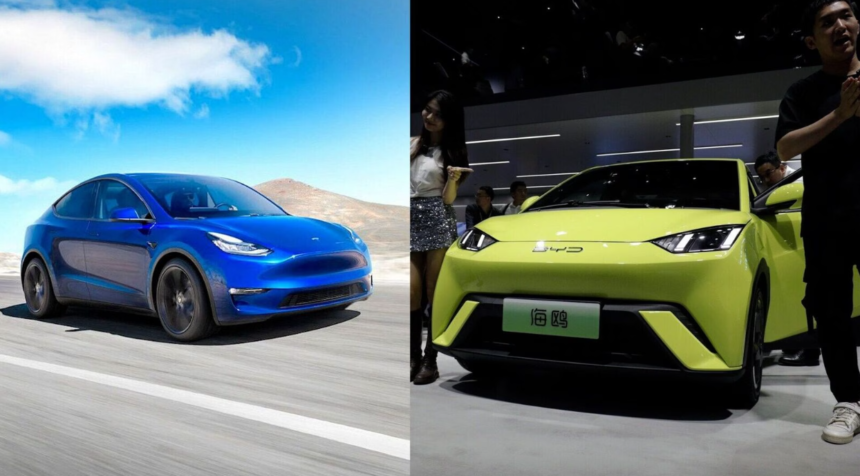In the fourth quarter of 2023, BYD surpassed Tesla to become the world’s largest electric vehicle manufacturer.
According to a stock exchange report, the Chinese corporation sold a record number of automobiles last year, including 525,409 battery electric vehicles (BEVs) in the three months ending December 31. Tesla announced on Tuesday that it delivered 484,507 vehicles during the quarter, also a record.
Elon Musk’s Tesla (TSLA) nevertheless outsold BYD in 2018, selling 1.8 million electric vehicles. BYD sold 1.57 million electric vehicles, a 73% increase over 2022, and 1.44 million hybrids. However, Tesla’s lead over its Chinese opponent, estimated to be around 230,000 units in 2023, was substantially narrower than the 400,000 units reported in 2022.

BYD’s quick expansion, which is funded by Warren Buffett, is emblematic of China’s burgeoning EV industry. China’s transition to electric vehicles is moving swiftly, thanks to significant government support for the industry. And Japanese automakers have been aggressively expanding into Europe, much to the chagrin of traditional rivals such as Volkswagen and Renault. The EU has initiated a probe into Chinese state subsidies.

Beijing has set a target of 20% new energy vehicles (NEVs) sold yearly in China by 2025, which includes BEVs, plug-in hybrids, and hydrogen fuel cell vehicles. The government expects NEVs to reach the “mainstream” of new automobile sales by 2035.

According to figures provided last month by the China Association of Automobile Manufacturers, 8.3 million units of new energy cars were sold in the first 11 months of 2023, accounting for more than 30% of overall automobile sales.

According to official media, Miao Wei, former minister of China’s Ministry of Industry and Information Technology, stated at an automobile symposium in November that the government’s NEV penetration objective of 50% by 2035 is likely to be met by 2025 or 2026 at the latest. Analysts attribute China’s worldwide industry leadership to its large market size, cheap labor, and supply chain dominance.

“China is now leading in production and increasing its comparative edges, banking on its massive domestic market and the first mover advantage,” Natixis Asia analysts stated in a late November study. Its first-mover advantage, as well as government assistance through infrastructure investment and subsidies, have made it simple for Chinese EV manufacturers to expand both locally and internationally, they claim.

However, increased competition and a nasty price war last year hurt several automakers’ profit margins. As China’s economy slowed, automakers were concerned about a drop in demand. Tesla slashed prices in China in January to entice customers, stalling growth and sparking a pricing war. To remain competitive, dozens of other automakers followed suit.

The price war has increased sales but jeopardized industry profitability. According to numbers issued by the Chinese Passenger Car Association, a government-backed industry body, China’s car sector reported a profit margin of only 5% in the first 11 months of last year, lower than the 5.7% in 2022 and the 6.1% in 2021.

To compensate for the declining home market, Chinese automakers have sought expansion outside the country by growing in Europe, Australia, and Southeast Asia. Last September, BYD sent a large group to a car show in Germany. A representative said at the time that the business hoped to quadruple the number of dealer partners in Europe by 2023 and to increase foreign sales to 250,000 from around 56,000 in 2022. It announced last month that it would develop an EV facility in Hungary, its first passenger car plant in Europe. It already has a bus manufacturing plant in Komárom, Hungary.
Click here, to check out the latest post on Instagram.
Also read: Mastering Buyer Problem: Strategies For Effective Solutions
image source: google




































